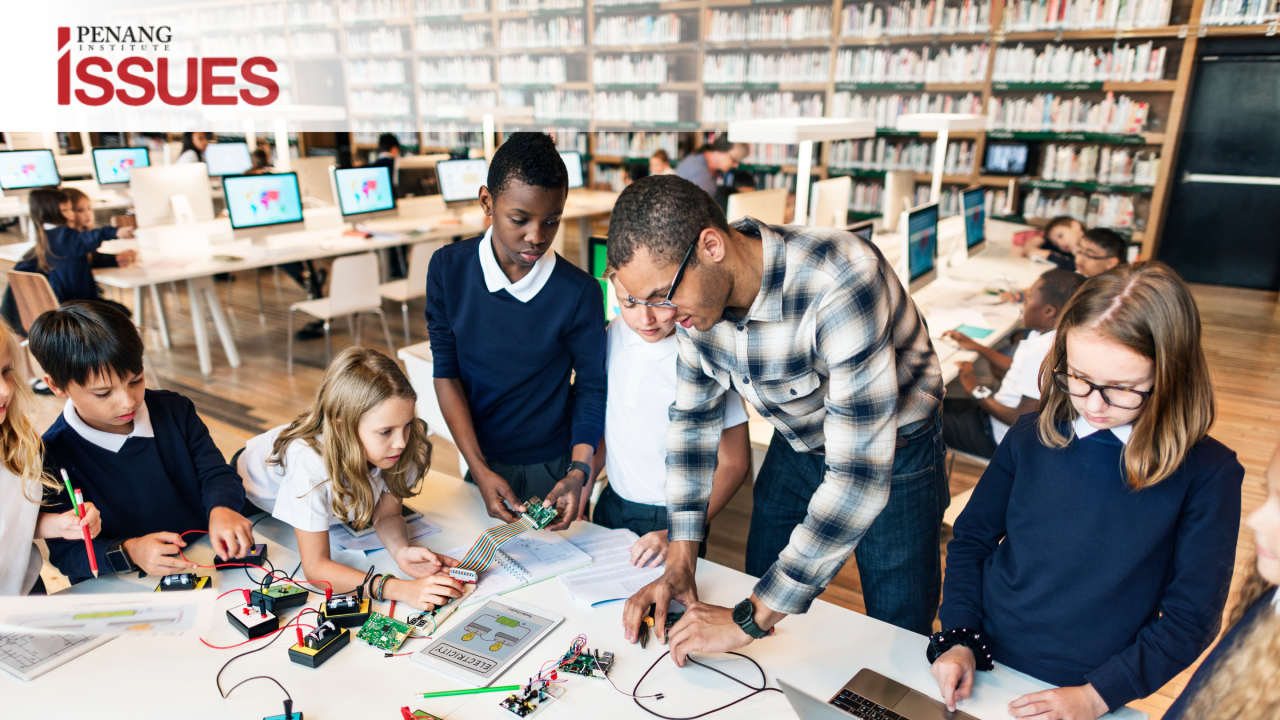
EXECUTIVE SUMMARY
- The Program for International Student Assessment (PISA) is an international assessment that measures 15-year-old students’ reading, mathematics, and science literacy. It is typically conducted triennially, with the current cycle experiencing a one-year delay (from 2021 to 2022) due to the pandemic.
- In the ASEAN region, the latest Programme for International Student Assessment (PISA) scores have dropped, with Malaysia showing the most significant decline compared to Singapore, Hong Kong, Korea, and Vietnam.
- Malaysia’s PISA results fell by 6.26% from 431 in 2018 to 404 in 2022 in the overall scores whilst Indonesia and Thailand decreased by 4.09% and 4.36% respectively. Singapore, meanwhile, held on to the region’s top spot.
- The PISA results indicate that Malaysia’s school education delivery system requires further improvement.
- We recommend that the STEM teaching delivery eco-system should be implemented holistically in line with PISA, involving collaboration among educators, policymakers, and parents to create a supportive and conducive learning environment. Additionally, ongoing assessment and adjustment of these strategies based on feedback and outcomes are deemed to be crucial for sustained improvement.
- Singapore consistently performed best across all three subjects in both years.
- Hong Kong showed a decline in Mathematics and Reading but a slight improvement in Science.
- Korea had a stable performance with a slight increase in Mathematics and Science scores and a slight decrease in Reading.
- Vietnam experienced a significant decline in Mathematics and Science scores but a slight decrease in Reading.
- Indonesia showed declines in all subjects over the years but remained consistently below Malaysia in terms of scores.
- Training in Modern Pedagogical Approaches: Provide teachers with continuous professional development opportunities to enhance their teaching methods. Emphasise student-centred learning, project-based assessments, and the incorporation of technology to engage students and foster critical thinking.
- Training in Modern Pedagogical Approaches: Provide teachers with continuous professional development opportunities to enhance their teaching methods. Emphasise student-centred learning, project-based assessments, and the incorporation of technology to engage students and foster critical thinking.
- Specialised Training: Offer specialised training in areas identified as weaknesses in the PISA results, such as Mathematics and Reading.
- Evaluate training effectiveness: Training should be evaluated to see how effective teachers’ current training offerings are. Measuring training effectiveness can be conducted through one-to-one discussions, surveys and questionnaires, post-training quizzes, and assessments.
- Incorporate Assessment Literacy: Equip teachers with the skills to design assessments that align with PISA objectives. This includes creating tasks that assess HOTS and problem-solving abilities.
- Reform the Curriculum: Review and update the national curriculum to ensure it aligns with global standards and emphasises critical thinking, problem-solving, and practical application of knowledge in real-world scenarios.
- Enhance STEM Education: Incorporate a comprehensive range of Science, Technology, Engineering, and Mathematics (STEM) subjects and hands-on activities into the curriculum. This will nurture innovation, creativity, and critical thinking skills among students.
- Modernise Learning Materials: Provide schools with up-to-date textbooks, digital resources, and educational technology to enhance learning experiences.
- Expand Access to Quality Education: Ensure equitable access to quality education by investing in schools in underserved areas and providing technology-rich environments supports to disadvantaged students to promote digital literacy, creativity, and collaboration among them.
- Smaller Classes: Implement policies to reduce class sizes, allowing teachers to provide more personalised attention to students, fostering communication skills, teamwork, and socio-emotional development which can improve learning outcomes.
- Formative assessment, by providing real-time feedback, enabling adjustments in instruction, identifying learning gaps, fostering engagement and motivation, and involving parents, can enhance students’ learning outcomes and, consequently, improve their performance in assessments like PISA.
- Data-Driven Decision Making: Utilise PISA and other assessment data to inform policy decisions, identify areas for improvement, and track progress over time.
- Implementing formative assessments and data-driven decision-making skills empowers students to reflect on their learning, set goals, and adapt their strategies, fostering self-directed learning and accountability.
- Promote Extracurricular Activities: Encourage participation in extracurricular activities that promote teamwork, leadership, and problem-solving skills, resilience, and adaptability, essential for lifelong learning and success in diverse settings.
- Hold schools, teachers, and administrators accountable for student performance in STEM by linking funding and resources to educational outcomes that cultivate HOTS.
- International Collaboration: Collaborate with international organisations, educational experts, and top-performing countries to share best practices, resources, and innovative strategies for improving educational outcomes.
- International collaboration promotes global awareness, cultural competence, and the exchange of diverse perspectives, enhancing students’ adaptability and open-mindedness.
- Expand access to high-quality early childhood education programmes to ensure children are well-prepared for primary school and that they develop a strong foundation in literacy, numeracy, creativity, and socio-emotional skills for lifelong learning and adaptability.
- Implement policies to address socioeconomic disparities in education by providing targeted support to disadvantaged students, including scholarships, tutoring, and mentorship programmes.
Background
Malaysia has long recognised the growing need to integrate higher-order thinking skills (HOTS) into its school curriculum. HOTS encompasses a range of cognitive skills like reflection, value reasoning, innovation, problem-solving, and decision-making, as defined by the Ministry of Education (MoE) in the Malaysian Education Blueprint 2013-2025. [1]
HOTS is not a recent initiative; in fact, the Ministry of Education (MoE) has been actively incorporating various educational reforms into its system since the 1980s. The emphasis on HOTS in Malaysia gained attention with the implementation of the Integrated Curriculum for Secondary Schools (ICSS) in 1988, followed by Vision 2020 in 1991, the promotion of critical and creative thinking skills in 1996, and the introduction of the ‘Smart School’ initiative in 1997. These reforms aim to foster an elevated level of cognitive abilities among students. [2]
To continue policy initiatives on HOT skills, the MoE undertook comprehensive research in 2013 to develop the Malaysia Education Blueprint 2013-2025. This blueprint outlines a comprehensive roadmap for integrating STEM education in Malaysia. [3] It underscores the crucial qualities that Malaysian students need in order to excel on the global stage. These attributes encompass a strong national identity, leadership skills, bilingual proficiency, a solid knowledge base, ethical and spiritual values, and the development of Higher Order Thinking (HOT) skills.
To make the curriculum more relevant to everyday life, the blueprint emphasises the incorporation of HOTS into topic content. Despite initiatives like the i-Think project and Kemahiran Berfikir Aras Tinggi(KBAT) by the MoE carried out since 2012 to equip teachers and students with creative thinking tools, problem-solving techniques, and critical thinking skills, there has not been significant demonstrable improvements.
The blueprint highlights that 50 percent of lessons were delivered unsatisfactorily, proving a decline in current teaching standards. Despite the demand for HOTS, Malaysia’s performance in the PISA has been declining. Specifically, Malaysia’s score decreased by 6.26%, dropping from 431 in 2018 to 404 in 2022. Similarly, Indonesia and Thailand saw decreases of 4.09% and 4.36%, respectively. [4] In contrast, Singapore maintained its position as the top-performing country in the region.
PISA is an international assessment administered by the Organisation for Economic Co-operation and Development (OECD) that evaluates the reading, mathematics, and science literacy of 15-year-old students every three years. Indeed, STEM education, which focuses on Science, Technology, Engineering, and Mathematics, plays a crucial role in developing HOTS. STEM subjects require analytical thinking, problem-solving, and creativity, which are fundamental components of HOTS. Engaging with these disciplines nurtures critical thinking abilities, encourages innovative approaches to challenges, and enhances logical reasoning—all of which are key aspects of higher-order cognitive skills. Furthermore, as global attention shifts towards these skills, equipping individuals with the ability to make
connections between these interconnected disciplines becomes increasingly critical.
Penang STEM initiative in fostering HOTS
HOTS activities to raise the country’s PISA ranking have already been developed and carried out by the MoE. At the state level, the Penang state government has embarked on their own plans to nurture STEM talents.[5]
The Penang state government has been actively promoting STEM education through Penang STEM, a collaboration between six centres and the North-East Education Department. These centres include PSDC, Penang Digital Library, Tech Dome Penang, @CAT, Penang Science Cluster, and Penang Math Platform. The initiative aims to boost student interest in STEM, especially during lower secondary school years, and even at primary school level.
Despite these concerted efforts, the Penang state government remains concerned about the lack of interest in STEM subjects among students. There is also a notable lack of preparedness among teachers to effectively implement HOTS during STEM instruction. Even teachers who recognise and understand the significance of HOTS seem to struggle with its practical application in the classroom.


Based on the Table above, the challenges faced by teachers in STEM education directly impact teachers’ ability to foster HOTS among students. A significant issue is their lack of exposure and training, making it challenging to design activities that promote critical thinking and problem-solving. Continuous professional development is essential, yet many of them lack sufficient ongoing training in innovative teaching methodologies that stimulate HOTS. Additionally, the absence of clear guidelines and support systems hampers their efforts to implement HOTS-focused activities effectively. Limited in-house training initiatives further restrict the opportunity to deliver their best classroom teaching deliveries. Consequently, teachers’ uncertainty in implementing STEM activities has somewhat hindered their ability to engage students in higher-level thinking tasks, thereby impacting the development of students’ HOTS and their interest in STEM subjects, leading to declining PISA results as shown below.

Source: Organization for Economic Co-operation and Development (OECD). (2019, 2022.)
What the PISA results tell us
Table 2 above presents the PISA results for Malaysia in 2018 and 2022, comparing its performance with selected countries. Based on the data, we can conclude the following:
Mathematics:
In 2018, Malaysia scored 440, dropping to 409 in 2022. Among the selected countries, Malaysia performed better than Indonesia but lagged behind Singapore, Hong Kong, Korea, and Vietnam in both years.
Reading:
In 2018, Malaysia scored 415, dropping to 388 in 2022.
Again, Malaysia outperformed Indonesia but was surpassed by Singapore, Hong Kong, Korea, and Vietnam in both years.
Science:
In 2018, Malaysia scored 438, and remained relatively stable at 435 in 2022. Malaysia performed better than Indonesia but was outperformed by Singapore, Hong Kong, Korea, and Vietnam in both years.
Comparison with Other Countries:
Key Points for Malaysia:
Declining Scores: Malaysia experienced a decline in scores across all three subjects from 2018 to 2022.
Ranking: While Malaysia outperformed Indonesia, it was consistently behind Singapore, Hong Kong, Korea, and Vietnam.
Stable Science Scores: Unlike Mathematics and Reading, Malaysia's Science scores remained relatively stable over the years.
Improving PISA Results
Improving PISA results requires a multifaceted approach involving government policies, educational strategies, and community involvement. Recommendations to improve PISA results must be aligned with fostering 21st-century skills. These skills emphasise critical thinking, creativity, communication, collaboration, digital literacy, and socio-emotional learning, essential for success in today’s interconnected and rapidly changing world.
Here are some policy recommendations:
1. Strengthen Training Programme/Workshop/Professional Development:
2. Curriculum Enhancement:
3. Invest in Educational Resources:
4. Reduce Class Sizes:
5. Enhance Assessment and Feedback Mechanisms:
6. Foster a Culture of Lifelong Learning:
7. Accountability:
8. Collaborate with International Partners:
9. Invest on Early Childhood Education:
10. Address Socioeconomic Disparities:
By implementing these recommendations, Malaysia can work towards improving its PISA results and ensuring that all students have access to high-quality education that prepares them for success in the global economy.
Equitable access to education and targeted support for disadvantaged students foster inclusivity, empathy, and social responsibility, preparing students to contribute positively to their communities and society.
Incorporating these recommendations into educational policies and practices not only aims to improve academic performance but also cultivates a well-rounded education that nurtures 21st-century skills.
Conclusion
In conclusion, the challenges faced by Malaysia, particularly in Penang, underscore the critical importance of nurturing a robust STEM education ecosystem. The recent PISA 2022 rankings revealed a pressing need to enhance HOTS among students. A concerted effort to bolster STEM education not only addresses the disparities highlighted in PISA findings but also cultivates a highly skilled workforce crucial for propelling Penang’s semiconductor industry up the value chain.
By prioritising initiatives such as curriculum enhancement, teacher training, and community engagement, Penang can foster an environment conducive to the development of critical thinking, creativity, and innovation among its students. This approach aligns with the global trend towards knowledge-driven economies, and prepares the workforce to embrace disruptive technologies characteristic of the Fourth Industrial Revolution.
Furthermore, the semiconductor industry’s advancement, particularly in areas like IC design and advanced packaging, relies heavily on a pool of skilled STEM talent. By investing in STEM education and empowering students to pursue careers in these fields, Penang can position itself as a hub for semiconductor innovation and attract investment from both domestic and international players. In doing so, Malaysia not only addresses its educational challenges but also ensures sustainable economic growth and competitiveness in the global semiconductor market.
In essence, leveraging PISA rankings as a catalyst for educational reform, enhancing HOTS, and nurturing STEM talent can propel Penang's semiconductor industry towards greater heights.
References
Mohamad Hisyam, I., Muhamad Furkan, M.S., Nurul Akmal, M.N. (2019). The issues and challenges in empowering STEM on Science teachers in Malaysian secondary schools.
International Journal of Academic Research in Business and Social Sciences. Vol. 9 (13)
Special Issue: Revolutionising education: Challenges, innovation, collaboration.
Nur Farhana, R., & Othman, T. (2017). Can education institution implement STEM? From Malaysian teachers’ view. International Journal of Academic Research in Business and
Social Sciences. Vol. 7 (3). ISSN: 2222-6990
Organization for Economic Co-operation and Development (OECD). (2019).
https://www.oecd.org/pisa/Combined_Executive_Summaries_PISA_2018.pdf
Organization for Economic Co-operation and Development (OECD). (2022).
https://www.oecd.org/pisa/OECD_2022_PISA_Results_Comparing%20countries%E2%80%99%20and%20economies%E2%80%99%20performance%20in%20mathematics.pdf
Rahman, N. A., Rosli, R., Rambely, A. S., & Halim, L. (2021). Mathematics teachers’;
practices of STEM education: A systematic literature review. European Journal of
Educational Research, 10(3),1541-1559.
Siew, N. M., Amir, N., & Chong, C. L. (2015). The perceptions of pre-service and in-service teachers regarding a project-based STEM approach to teaching science. SpringerPlus.
4(1),1–20.
Footnotes
[1] Tamilarasi, C. Nurzatulshima, K., Siti Salina, M., Lavanya, S., & Zeinab, Z. (2023). Factors influencing teaching higher-order thinking skills among Mathematics teachers in Malaysian primary schools. Pertanika J. Soc. Sci. & Hum, 31 (4): 1509 – 1524. [2] Rahida Aini, M.I. (2019) The relationship between teacher efficacy and teacher’s delivery effectiveness in the presence of hots training program. Doctoral thesis, Universiti Utara malaysia. https://etd.uum.edu.my/9122/ [3] Siti Hamizah, A., Marlina, A., & Muhammad Abd Hadi, B. (2022). STEM education in Malaysia: A review. Learning Science and Mathematics. Issue 15, 125-139. [4] M’sia records biggest drop compared to neighbours in Pisa scores. (2024). The Star, January 25[5] See footnote 3.M’sia records biggest drop compared to neighbours in Pisa scores
You might also like:
![The Value of Private Member’s Bills in Parliament: A Process Comparison between Malaysia and the Uni...]()
The Value of Private Member’s Bills in Parliament: A Process Comparison between Malaysia and the Uni...
![Fiqh al-Muwatanah (Fiqh of Citizenship): A New and Inclusive Islamic Approach for Multi-religious So...]()
Fiqh al-Muwatanah (Fiqh of Citizenship): A New and Inclusive Islamic Approach for Multi-religious So...
![Protecting Women: An Overview of Women’s Legal Rights in Southeast Asia]()
Protecting Women: An Overview of Women’s Legal Rights in Southeast Asia
![Urgent Need to Strengthen Malaysia’s Legal Framework Against AI-Driven Scams]()
Urgent Need to Strengthen Malaysia’s Legal Framework Against AI-Driven Scams
![Strengthening Malaysia’s Private Higher Education Sector through a Structural Revamp]()
Strengthening Malaysia’s Private Higher Education Sector through a Structural Revamp






